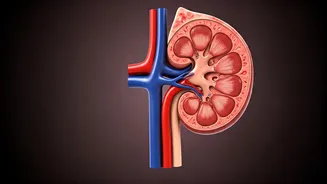Kidney Strain Concerns
High protein intake, especially from animal sources, has a direct impact on kidney health. The body processes protein, generating increased levels of urea
and nitrogen. This forces the kidneys to work harder to filter these waste products. This strain is especially concerning for individuals with existing kidney conditions, as it can accelerate kidney damage or exacerbate their condition. The increased workload on the kidneys resulting from excessive protein consumption can lead to reduced kidney function over time, potentially leading to chronic kidney disease. Therefore, it is important to monitor protein intake, especially for those with pre-existing kidney issues or risk factors, to prevent potential kidney strain and maintain optimal kidney health.
Weight Gain Reversal
Although protein can initially aid in weight loss, excessive protein consumption can lead to weight gain. Protein, like all macronutrients, contributes calories to your daily intake. If you consume more calories from protein than your body needs for energy expenditure, the surplus is stored as fat. This caloric surplus can counteract the weight loss benefits associated with a balanced protein intake and can result in weight gain. It's important to balance protein consumption with calorie needs and overall dietary habits. Understanding your body's energy requirements and maintaining a balanced diet is crucial to achieving and sustaining weight management goals. Be mindful of portion sizes and overall calorie intake to prevent the potential for weight gain from excess protein.
Nutrient Deficiency Issues
Focusing too heavily on protein can often lead to a deficiency in essential micronutrients such as vitamins, minerals, and antioxidants. These vital nutrients are largely found in plant-based foods, including fruits, vegetables, and whole grains. When a diet excessively emphasizes protein, there is often less room for these nutrient-rich foods. This imbalance can lead to nutrient deficiencies, potentially causing a range of health problems. Vitamin and mineral deficiencies can impair various bodily functions, from energy production and immune function to cell repair and growth. Furthermore, antioxidants, abundant in plant foods, play a crucial role in protecting cells from damage caused by free radicals. Therefore, a balanced diet that includes a wide variety of plant foods alongside appropriate protein intake is essential for overall health and well-being, helping to avoid nutrient deficiencies.
Digestive System Upset
Excessive protein intake, particularly when coupled with low fiber consumption, can significantly disrupt your digestive system. High protein diets, often lacking in fiber-rich fruits and whole grains, can lead to constipation and bloating. The lack of fiber can slow down the passage of food through the digestive tract, resulting in these uncomfortable symptoms. Additionally, an imbalanced diet can upset the delicate balance of bacteria in your gut. A healthy gut microbiome, which is essential for proper digestion, immunity, and overall well-being, can be negatively affected. This imbalance can cause digestive distress and increase the risk of other gut-related problems. Therefore, for optimal digestive health, maintaining a balanced diet with adequate protein, plenty of fiber, and a variety of plant-based foods is essential.
Heart Health Risks
High protein diets, especially those that rely heavily on red or processed meats, can negatively affect your heart health. These types of meats are often high in cholesterol and saturated fats, which are known contributors to the development of heart disease. Elevated levels of cholesterol and saturated fat can lead to the buildup of plaque in the arteries, a condition known as atherosclerosis. This buildup narrows the arteries, restricting blood flow and potentially leading to serious cardiovascular events like heart attacks and strokes over time. While protein is essential, the source matters. Opting for lean protein sources, such as fish, poultry, and plant-based proteins, can minimize these risks and support overall heart health. Regular monitoring of cholesterol levels and adopting a heart-healthy diet are vital for prevention.
Dehydration Concerns
The metabolism of protein requires a significant amount of water to flush out waste products from the body. Consequently, consuming excessive amounts of protein without adequate fluid intake can easily lead to mild dehydration and fatigue. As the body processes protein, it generates nitrogenous waste, which is excreted through urine. If sufficient fluids aren't consumed, the kidneys struggle to eliminate these waste products effectively, which can lead to dehydration. Dehydration can manifest as fatigue, reduced cognitive function, and decreased physical performance. It is therefore crucial to increase water intake when consuming a high-protein diet to ensure proper hydration. Regularly drinking water throughout the day can support the body's natural functions, maintain optimal energy levels, and prevent the adverse effects of dehydration associated with protein metabolism.



















